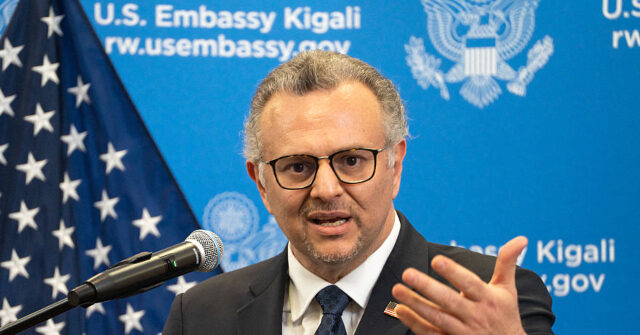Massad Boulos, President Donald Trump’s senior adviser for Africa policy, told Reuters on Thursday that the administration wants the Democratic Republic of the Congo (DRC) and Rwanda to sign a peace treaty with each other — and then sign Ukraine-style minerals deals with the United States.
Boulos predicted a minerals deal with the DRC would be signed on the same day as the Congo-Rwanda peace accords, “and then a similar package, but of a different size, will be signed on that day with Rwanda.”
That day, according to Boulos, should come sometime in the next two months. At a meeting in Washington last week, the DRC and Rwanda agreed to an ambitious timetable that included both of them submitting drafts of their half of the peace treaty on May 2. Secretary of State Marco Rubio is scheduled to preside over another meeting in Washington to finalize the peace treaty by mid-May.
Rwanda’s side of the deal included a pledge to stop supporting M23 and other insurgent groups that have been rampaging through the eastern Congo. The insurgents captured several key cities in the DRC at the beginning of the year, and when they marched through the gates of their captured towns, Rwandan troops marched right alongside them.
In return for Rwanda pulling out its troops and halting support for the insurgents, the DRC will promise to take Rwanda’s security concerns seriously, including action against a Rwandan insurgent group that operates in the Congo, the Democratic Forces for the Liberation of Rwanda (FDLR).
The FDLR is one of more than a hundred armed groups operating in the eastern Congo. It is of particular concern to Rwanda because its members are mostly members of the Hutu tribe and they are determined to overthrow the government of Rwanda, which is largely controlled by the Tutsi tribe at present. The Hutus attempted to exterminate the Tutsis in the 1994 Rwandan genocide.
Boulos said the bilateral mineral deals between the U.S. and the two African nations would have to be completed before the peace treaty could be signed.
“The (agreement) with the DRC is at a much bigger scale, because it’s a much bigger country and it has much more resources, but Rwanda also has a lot of resources and capacities and potential in the area of mining as well … not just the upstream, but also midstream and downstream to processing and refining and trading,” he told Reuters.
After meeting in Doha, Qatar, on Thursday, delegations from the DRC and Rwanda said they were close to agreement on a draft of the peace treaty.
Boulos was not exaggerating when he said a U.S. minerals deal with the DRC would be much larger than a deal with Rwanda. The DRC has trillions of dollars’ worth of untapped mineral resources, including precious metals, cobalt, copper, and lithium.
The unstable security situation in the eastern Congo is a major reason why these resources have not been tapped. Investors will want to see the area pacified before they pour huge amounts of money into mining and refining projects. M23 insurgents have reportedly seized control of major Congolese mines and shipped the pilfered minerals to Rwanda.
The United Nations was supposed to stabilize the region with a peacekeeping force called MONUSCO and, while it helped to push M23 back over a decade ago, it has been largely ineffective during the current crisis.
President Felix Tshisekedi asked MONUSCO to withdraw last year, but the peacekeepers are still there. Seventeen of them have been killed so far this year during battles between M23 and Congolese government forces.
South Africa announced on Thursday that it has begun withdrawing its peacekeepers from rebel-held areas in the eastern Congo. Malawi and Tanzania are also pulling their forces out, believing them to be trapped in hostile territory after M23 advanced and captured the city of Goma in January.
Hundreds of Congolese troops were also cut off by the rebel advance. The International Committee of the Red Cross began escorting those soldiers and their families out of rebel territory on Wednesday.
President Tshisekedi raised the idea in March of giving the U.S. exclusive mineral rights in exchange for assistance against the M23 insurgency.
“Your election has ushered in the golden age for America. Our partnership would provide the U.S. with a strategic advantage by securing critical minerals such as cobalt, lithium, copper and tantalum from the Democratic Republic of Congo,” Tshisekedi told President Donald Trump in a letter.
Boulos, who has existing business interests in Africa, made a trip to the DRC soon after Tshisekedi sent his letter to begin hammering out the terms of a mineral deal.
Read the full article here


